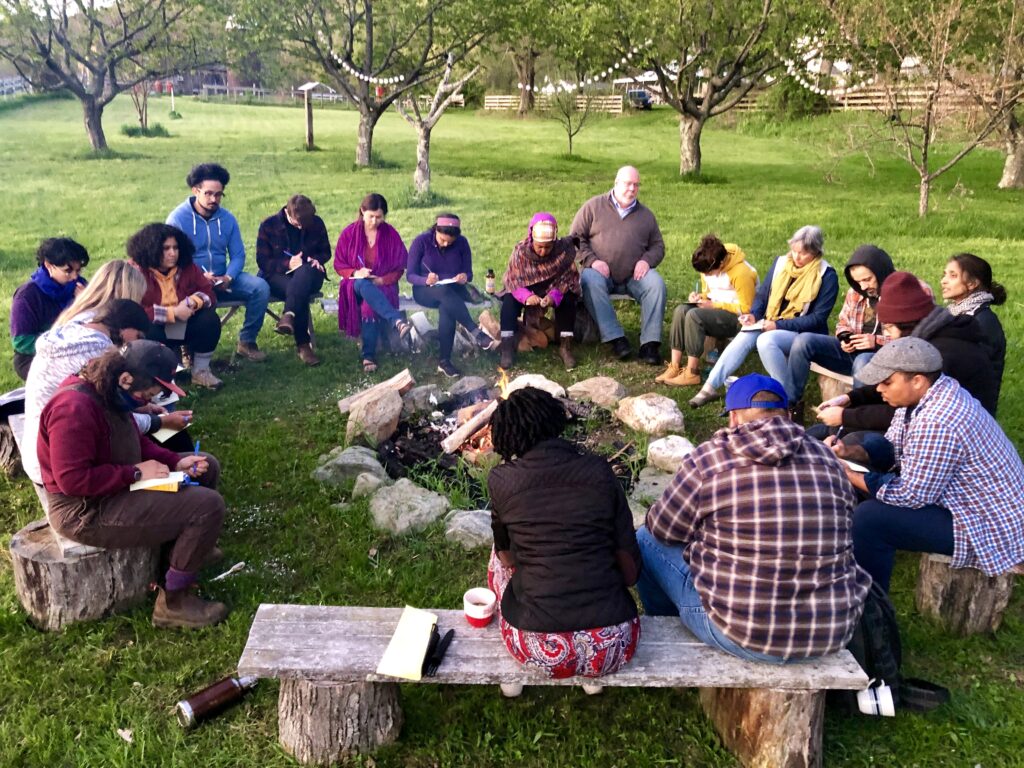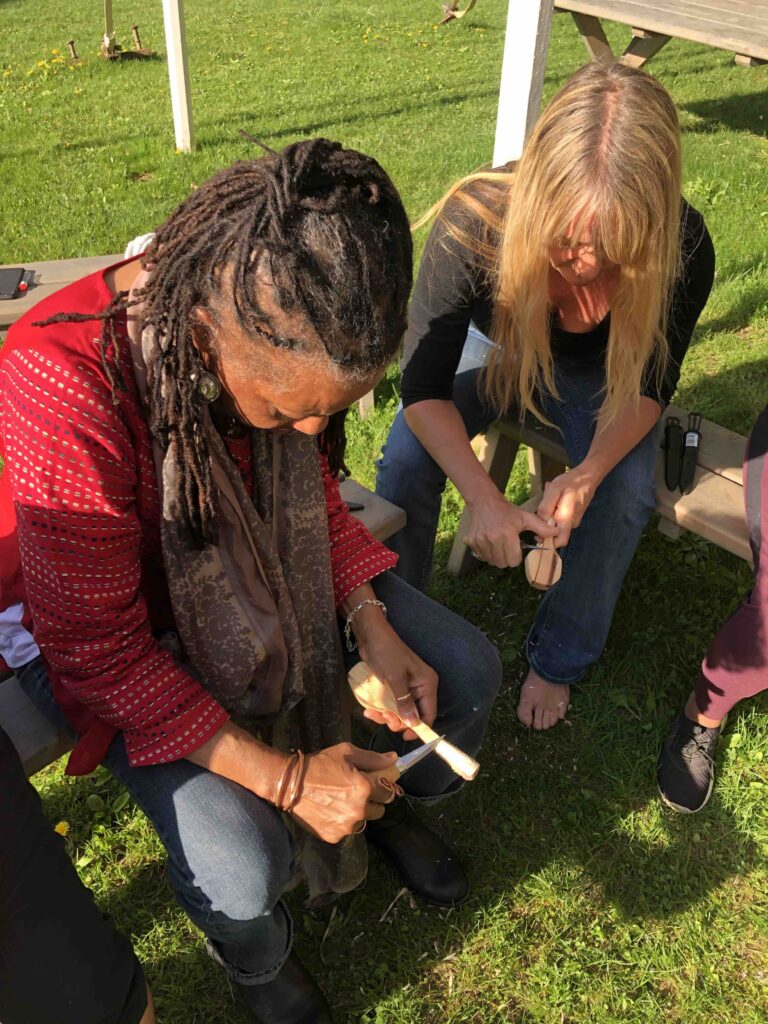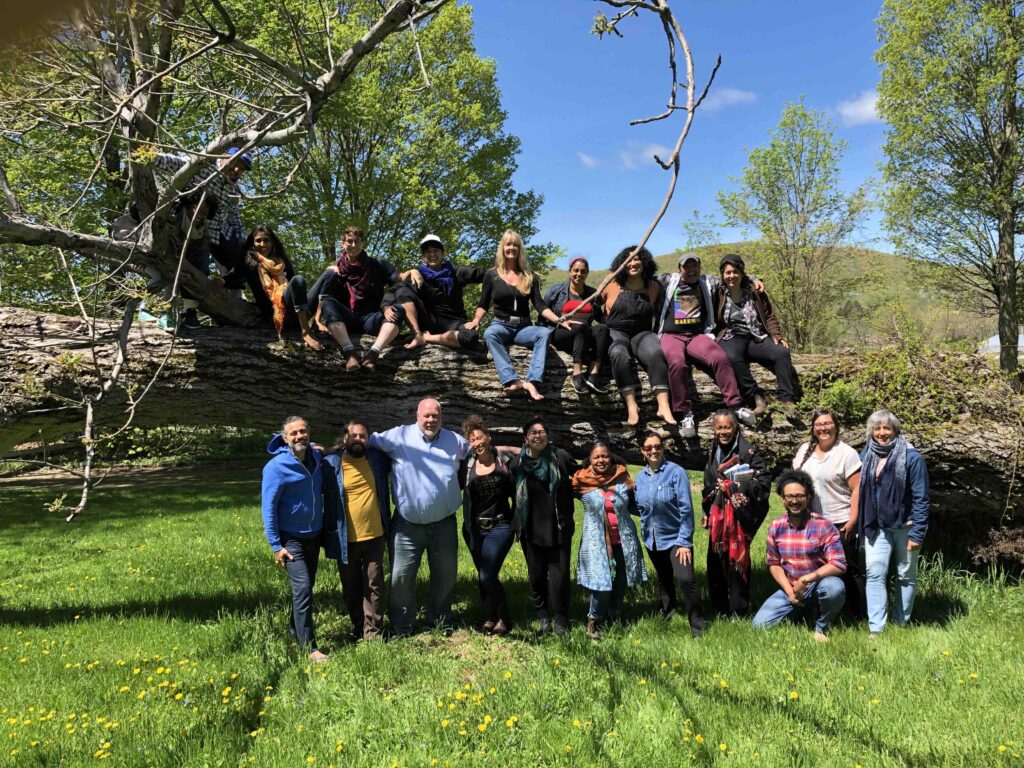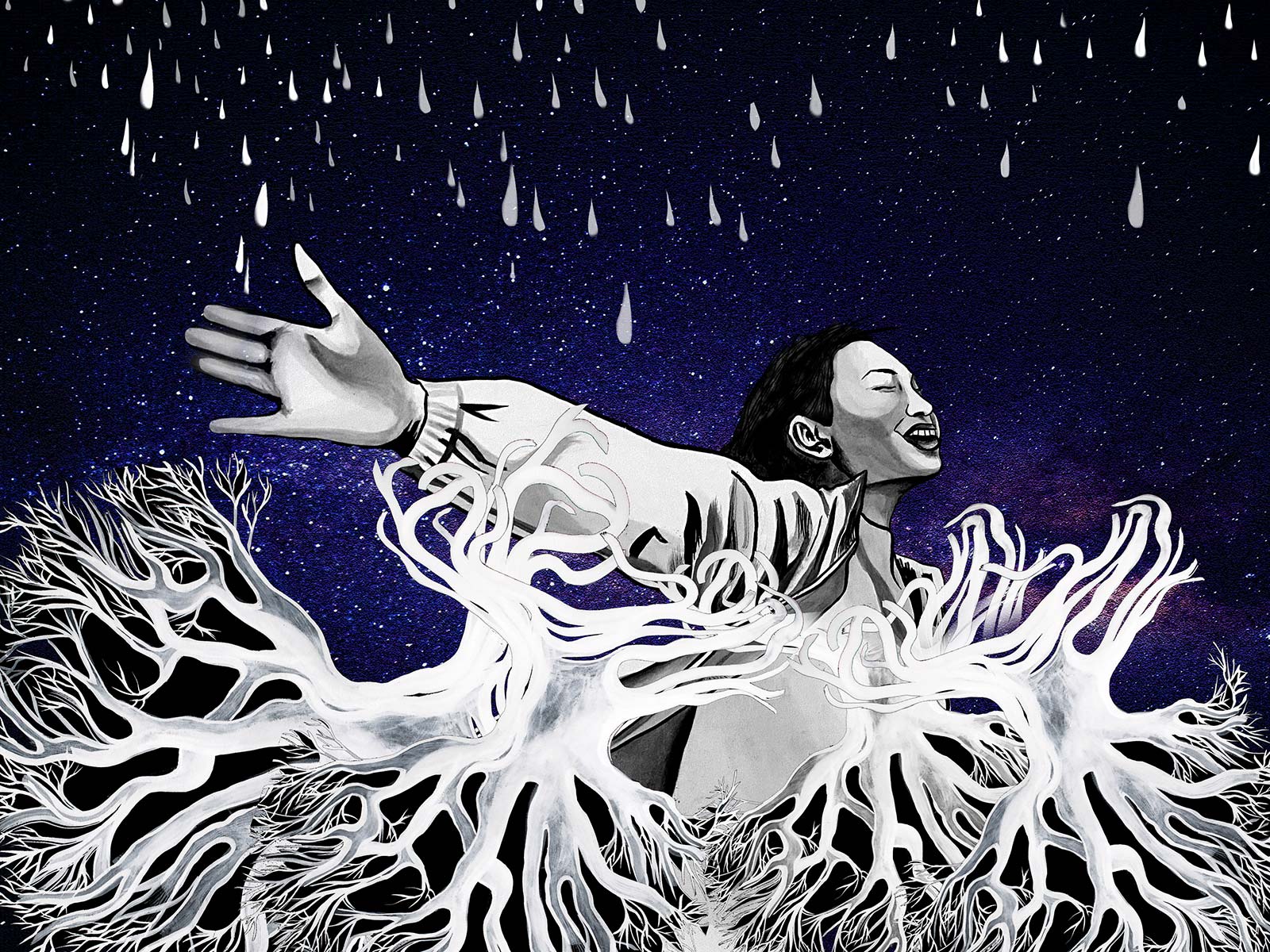The history of the land that we call the United States is built on genocide, slavery, colonialism, and white supremacy. With that as the foundation, and navigating the variety of lived experiences of these truths, this year Center for Whole Communities (CWC) convened 21 leaders from across the country for a year of learning and transformation. Together, we have considered what it means to live, work and breathe justice as we wrestle with that legacy and our own responsibility for transforming it.
All of the elements of that legacy were present with us as we arrived at The Watershed Center, on Mahican traditional territory in Millerton, New York. For a few still-hesitant spring days of May, we sat together with the themes of land and justice, and the elements of transformation that emerged in our response to these toxic histories of dispossession.

Before that week, we had only met in ethereal terrain, via bytes and pixels on video-conference calls. This was our first encounter breaking bread; sharing the textures of breath, the sounds of a room, the wind in the trees, spoon-carving knives nicking fingers in small blood offerings to place. Drawn in by stories, by aspirations for ourselves and our world, by honest visions of one another, we shared space, showed up, and dug in.
I feel like I was given room to breathe into myself, to sit with questions that I am rarely asked.
Whole Communities Fellow
We were held in radical hospitality, guests of our new and deepening connections in that place: hosted by the Watershed Center, WILDSEED Community Farm & Healing Village, representatives of Schaghticoke First Nations, and adjacent farms. The community of streams, birds, stones, trees—and ticks—were as much a part of our conversations, contemplation, and dreams as the human dynamics in which we swam.

We learned about one another’s challenges—in life and in work—and of the dynamic tensions produced by the forces at play in those spheres. We also heard each other’s longings and hopes; what nourished us; and how we nourish others. We made music, we danced, we carved spoons—were wounded and healed, were fed and sheltered, were challenged and protected, both internally, in the spaces we inhabited, and by the newly forming bonds among us.
The clear acknowledgement of eldership was an honor in this multicultural setting… navigating the boundaries of difference of age, race, religions, sexual orientations, etc. requires a big heart and expanded consciousness…
Whole Communities Fellow
In this new evolution of CWC’s transformative change work, we introduced fellows to our principle practices: Dialogue, Story, Awareness Practice, Creativity, and Working with Difference. We set the table together for our year-long collaboration, and deepened our dialogue on the complex themes of land, justice, and repair. In those conversations, we have been indebted to our friend and colleague Mistinguette Smith who leads the Black/Land Project for calling our attention to the distinction between reparations and repair.
CWC was originally a land-based organization founded by a visionary couple with roots in, and a concern for transforming the historically white environmental movement. Over the last decade we have gone through our own transition from landed to landless, from having a deep connection to a particular place, to leaving that place behind. We have actively embraced the idea of “Center” as a verb, rather than a noun. We are now led by a team of people from very different cultural backgrounds, each with different relationships to land, justice and the environmental movement.
We have been moving through our own process of healing around these themes of land, justice, and repair. Part of that healing is the fellowship itself, and the opportunity it offers us to continue to grow and learn together in community.
One clear commitment that has emerged within the fellowship is to examine and uplift the possibilities for Black-Indigenous solidarity. How can we we actively work to transform dispossession, and uphold (re)connection to the land? For example, in considering reparations for the enslavement of African Americans, how do we also acknowledge the underlying genocide that opened Indigenous territories for colonial exploitation in those same places?
The retreat left me with hard questions to think about regarding land/home and relationship to it, as a mixed-race person with ancestry not native to here…
Whole Communities Fellow
These questions of solidarity, of land and justice have followed us—and led us—through this year of shared learning and healing with leaders in conservation, social and environmental justice.
We have continued to build and grow the connections among us. On a recent zoom call a fellow reflected on the importance of ritual, the pause in the usual press of work and life that has been created through this fellowship commitment.

This poem from Flint, Michigan-based fellow Jeff Bean speaks to the power of community. We share it with gratitude for you, the many supporters of our work, and with a wildly enthusiastic shout-out to the incredible cohort of fellows: in love and solidarity we are walking with you.
I have a new community, a whole community Full of people who are unabashedly human Who are living to fulfill a promise they made to themselves in utero Who understand that language is how we communicate AND that the language we have was developed by the Colonizer AND thus is biased to maintaining the power of that colonization This is a community that realizes when they hear “We don’t even have a word for that” That it is a challenge and not the end of the discussion. We are a community of exploration of the infinite with a clear understanding That, while infinity spreads out forever It also goes inward at the same rate We are people who relish the idea that being in the middle of something Can put you at the edge We eat paradox for breakfast because we have no idea what will be served for dinner. We love quietly because it has so often been used as a weapon AND we are choosing to sit with love AND we will be together and apart, completely A new community, a whole community. -- Jeff Bean
This blog post is the work of multiple contributors. Thanks again to Jeff Bean – and to CWC team members Mohamad Chakaki, Jesse Maceo Vega-Frey, Susannah McCandless and Kavitha Rao.
